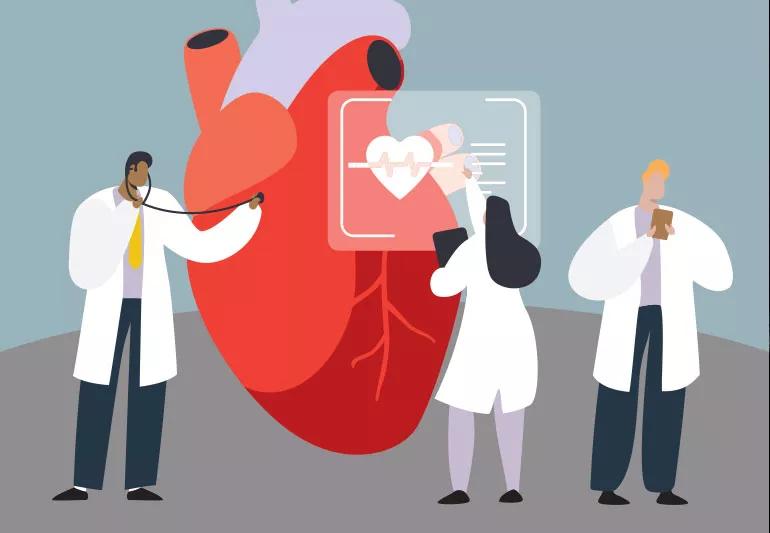Advertisement
Understanding who to see for the care you need

Heart disease is so common that it’s on the radar of every primary care physician. When a patient develops a cardiovascular risk factor, or a known risk factor worsens, most physicians take immediate action to prescribe medications or lifestyle interventions designed to prevent cardiovascular disease from developing or progressing.
Advertisement
Cleveland Clinic is a non-profit academic medical center. Advertising on our site helps support our mission. We do not endorse non-Cleveland Clinic products or services. Policy
“Most primary care physicians do a very good job of managing common risk factors, such as hypertension, high cholesterol and metabolic syndrome,” says cardiologist Leslie Cho, MD.
But there are times when an opinion from a cardiologist is warranted — for example, when heart disease is diagnosed, or risk is excessive.
“When patients start having atrial fibrillation, valve disease or coronary artery disease, they should see a specialist at least once,” says Dr. Cho.
Most physicians will quickly refer any patient who might benefit from seeing a specialist. But it’s also perfectly acceptable to seek an opinion on your own.
“If you aren’t getting satisfactory answers from your primary care physician, or you are worried about your health, a cardiologist can provide the answers you seek and put your mind at ease,” she says.
Training in the various medical and surgical subspecialties of cardiovascular care is standardized nationwide.
Cardiologists complete four years of medical school, followed by three years of residency in internal medicine before serving three or four years in a cardiology fellowship. One or two years of additional training may follow if they choose a subspecialty such as interventional cardiology, electrophysiology, heart failure or imaging. Some cardiologists do interventional procedures such as stenting, but they do not perform surgery.
Advertisement
After medical school, cardiac surgeons traditionally complete a five-year residency in general surgery, followed by two to three years of cardiothoracic (heart and lung) surgery fellowship. Some programs now offer four years of general surgery plus three years of cardiothoracic surgery. Other programs combine general and cardiac surgery into a single six-year program. The subspecialty of heart transplantation requires one additional year of training.
Extensive education and hands-on experience enable these specialists to become familiar with evidence-based best practices for diagnosing and treating various forms of heart disease and individualizing care.
“Education doesn’t stop after formal training is completed,” says Dr. Cho. “Medical knowledge changes so fast that education must continue for life.”
By adding the appropriate cardiovascular specialist(s) to your care team, you can have confidence everything possible is being done to protect your heart health. You may need only an occasional visit to the specialist. With some diseases like heart failure, however, the specialist may take over your care.
Rest assured that your heart team will communicate regularly with the primary care physician coordinating your overall healthcare.
“Having heart disease does not exempt you from developing other medical problems that may need attention. That’s why you should continue seeing your primary care physician unless instructed otherwise,” says Dr. Cho.
Here is a quick look at 10 different types of heart specialists and what they do:
Advertisement
This article originally appeared in Cleveland Clinic Heart Advisor.
Advertisement
Learn more about our editorial process.
Advertisement

Although allulose is an FDA-approved sugar substitute, more research is needed to understand its safety

Studies show those who walk faster tend to have a lower risk of heart disease

Recognizing subtle symptoms, like cold sweats, stomach discomfort and nausea, could be the key to survival

Statin use has been associated with weight gain but the reasons aren’t clear — and the benefits of statins far outweigh the risks

Some statins have been shown to slightly increase your risk of diabetes — but that shouldn’t keep you from taking the medication you need

Research points to an association between the health of your gums and cardiovascular disease

Virtual doctor appointments offer a quick, accessible solution thanks to advances in telehealth

Factors like temperature, energy levels and sleep quality play a role in determining whether working out in the morning or evening is best for you

Focus on your body’s metabolic set point by eating healthy foods, making exercise a part of your routine and reducing stress

PFAS chemicals may make life easier — but they aren’t always so easy on the human body

While there’s little risk in trying this hair care treatment, there isn’t much science to back up the claims